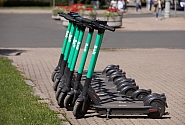
On Thursday, March 25, the Saeima in the final reading adopted amendments to the Road Traffic Law incorporating regulation of electric scooters, as well as providing for other changes.
So far, the regulation did not specify the road traffic regulations for electric scooters, previously the authors of the draft law indicated in the annotation, emphasising that the increasing number of scooters causes growing risks to traffic safety, especially for pedestrians. Last year, 88 road accidents involved electric scooters, the State Police indicated to the MPs at the meeting of the Economic, Agricultural, Environmental and Regional Policy Committee responsible for the implementation of the draft law.
The definition of an electric scooter is included in the law, according to which it is a vehicle equipped with an electric motor with a maximum speed of up to 25 kilometres per hour without pedals intended for one person and equipped with handlebars or grips mechanically connected to the deck.
Electric scooters will be allowed from the age of 14. Persons who have reached the age of 18 will not be required to hold driver’s licence. In turn, persons aged 14 to 17 will be required to hold a valid licence for bicycle or any category of vehicle.
Registration of electric scooters is also included in the law – just as in case of bicycles, registration of scooters will be voluntary, i.e. unregistered electric scooters will be allowed to participate in road traffic. For violations, the same administrative penalties will be imposed on drivers of electric scooters as cyclists.
The amendments also specify the rules for cyclists. Persons who have reached the age of 18 will no longer need a licence to ride a bicycle. For 20 years, cyclists in Latvia have been required a licence, however, it has been concluded that it does not correspond to the practice of other European countries, previously emphasised the authors of the draft law.
In turn, persons aged from 10 to 17 will be allowed to ride a bicycle independently, if he/she holds a valid licence for bicycle or any category of vehicle.
The amendments also supplement the definition of a vehicle, i.e. a device with a maximum speed exceeding 6 kilometres per hour is considered to be a vehicle. The law also clarifies the definitions of moped, tricycle, motorcycle, quadricycle and bicycle.
The amendments also specify exceptions to the requirement of a roadworthiness test. This will apply to vehicles equipped by a company (commercial operator) with registration plates for trade and used in road traffic in accordance with the procedures laid down in the legislation on the trade in vehicles.
The law has also been supplemented with provisions on the registration of tractor-towed interchangeable equipment and mechanical units, stating that it is voluntary, and it will be allowed to participate in road traffic on a temporary basis with such unregistered equipment.
It is also stipulated that a person will be authorised to drive a vehicle in Latvia with a driving licence issued by the United Kingdom, as was the case until now.
The amendments to the Law also provide that in future the State Police will be able to conclude contracts on the installation of speed cameras not only with the Road Traffic and Safety Directorate, but also with the state or local government road managing entities. Requirements for such arrangements will be determined by the Government.
Saeima Press Service







